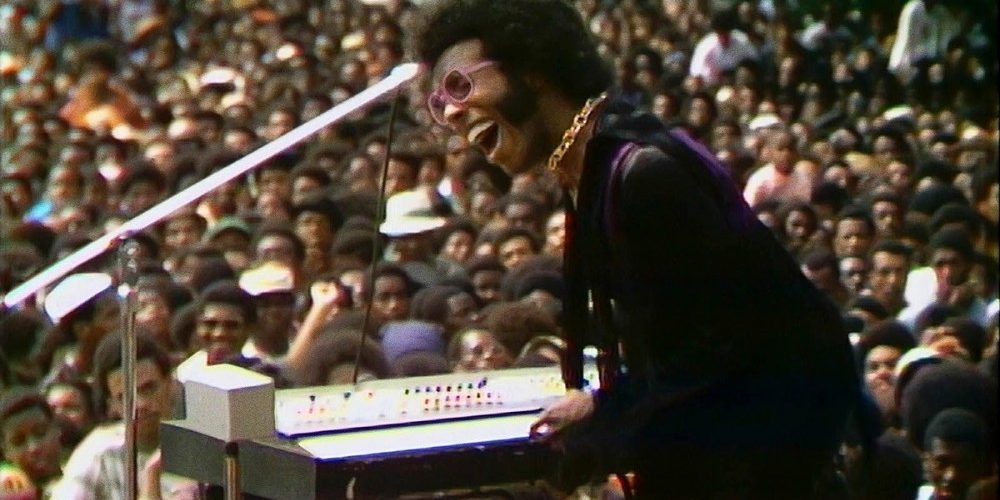Questlove’s Sundance-winner ‘Summer of Soul’ shines a light on a forgotten festival
Ahmir “Questlove” Thompson's directorial debut, the music documentary 'Summer of Soul (…Or, When the Revolution Could Not Be Televised),' was one of the big hits at this year's virtual edition of the Sundance Film Festival, nabbing both the Documentary Grand Jury Prize and the Audience Award. It's since been acquired by Disney's Searchlight and Hulu for $12 million (a Sundance record for a documentary), and will be released later this year. While they haven't released a trailer for the documentary yet, you can watch Sundance's "Meet the Artist" video with Questlove below. We also caught a screening of the film and our review follows.
Woodstock was not the only music festival held in the summer of 1969. Down state in steamy NYC over a number of Sundays from June to August, there was the Harlem Cultural Festival held in Mount Morris Park (now known as Marcus Garvey Park). Dubbed the "Black Woodstock" and, as said in Ahmir "Questlove" Thompson's joyous look at the up-till-now not well-known event, it happened during "a time where the Negro died and the Black Man was born." It was a time of change and a reassessment of black culture. It was also a time of protest. Black soldiers were disproportionately on the front lines in the Vietnam War. As stated in the film, part of the goal of the festival was to give the community an outlet for expression following the turbulence of the previous summer that followed the killing of the Rev Dr Martin Luther King.
Put together and promoted by a local lounge singer named Tony Lawrence (“a hustler in the best sense of the word”) and filmed for local broadcast by Hal Tulchin, the reels were said to be lost until recently, when they were discovered stored in a basement in amazingly good shape. Thompson took that footage and lovingly created this look at the artists and performers involved as well as the people behind its creation and the cultural importance that surrounded it. Performance footage is interspersed with newsreels of the time, and current interviews with the performers, people who worked, and attendees. It’s these heartfelt remembrances that drive the film and provide much of its emotion. Marilyn McCoo and Billy Davis Jr of The 5th Dimension’s story of how they got into a sold out performance of Hair, which gave them the idea to record a version of "Aquarius/Let the Sun Shine In" (the biggest single of 1969), is almost unbelievable.
It’s the performances, though, that are the star of Summer of Soul. With an incredible and eclectic lineup – including , (newly solo having left The Temptations) and the sweet soul of Don Covay – there were some real standouts. The film opens with a 19-year-old Stevie Wonder, on the cusp of blasting into the 70’s with his string of amazing classic albums, who plays the drums on one song so ferociously, he gives this film's director a run for his money. In a tribute to the Rev Martin Luther King Jr, the legendary gospel singer Mahalia Jackson, who was not feeling well that day, calls to the gods on her song "Take My Hand Precious Lord" (Dr King’s favorite song), and then hands it over to a young, awestruck and nervous Mavis Staples to finish.
There's also Sly and the Family Stone, whose performance security had to be handled by the Black Panthers as the NYC Police wouldn’t, raising the roof on "Everyday People" and "Higher"; and Nina Simone giving intense, fiery renditions of "Backlash Blues" and "To Be Young Gifted and Black," excoriating the crowd to be proud of who they are. Those and many more bring the film to life and, juxtaposed with images of the crowd, you get a real feel for how much these shows meant.
The film doesn't quite have the same energy to it as, say, Soul Power, the documentary about the 1974 Zaire music festival in Kinshasa, Africa during the "Rumble in the Jungle" fight between Muhammad Ali and George Foreman, but Summer of Soul is nonetheless an important, engaging document of a truly significant social and musical event that was almost lost to the dust heaps of history.
